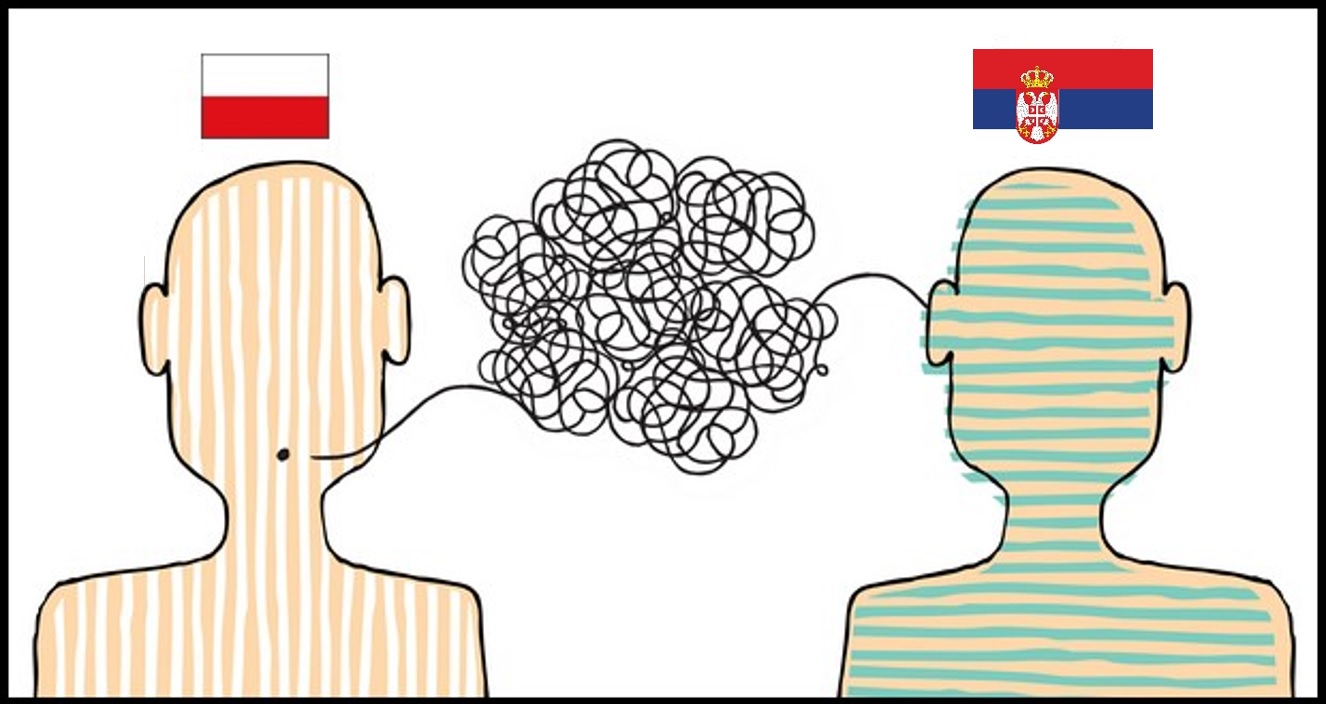How to find a good Serbian language teacher? Not an easy task. When choosing your Serbian teacher, pay attention to the traits that will help you recognize a true talent
False Friends in Serbian for Polish Speakers
16 False Friends in Serbian for Polish Speakers
While some English speakers make jokes about polishing their Polish, a simple Serbian sentence like “they remembered him” could make a Polish speaker think that they “forgot him”! The culprit which can cause this fuss is the language mechanism known as “false friends”. In this article you will learn 16 false friends in Serbian for Polish speakers
False friends is a linguistic occurrence that was first defined in 1928, although some attempts to do so date back to the 17th centry. The term false friends refers to the linguistic hazard when the words in different languages are pronounced or spelt in a similar or even the same way, but their meanings are different.
When learning a foreign language, it’s very important to learn the examples of this linguistic occurrence so as to avoid the pitfalls they create. In this article, we are going to look closely to some of the most promiment false friends in Serbian for Polish speakers.
It is interesting to note that, while they both are Slavic languages, Serbian (alongside Bosnian, Croatian and Macedonian) belongs to the subgroup of South Slavic languages, whereas Polish is a West Slavic language. Although there are many similarities between these two languages, there are also the differences (taking the form of a false friend).
False Friends in Serbian for Polish Speakers: the Verbs
A Polish speaker learning Serbian, or a Serbian speaker learning Polish, must stop and think before using quite a few verbs.
For example, the verb tłumaczyć in Polish means to translate, or explain in some contexts, whereas in Serbian the verb tumačiti means to interpret.
Moreover, the verb podróżować in Polish means to travel while Serbian people may associate with a verb družiti se (to be friends with somebody) since the word stems from the noun drug which in Serbian means a friend.
Additionally, the verb chodzić in Polish has a general meaning and means to go (and as such takes part in constructing many useful expressions) while in Serbian its meaning is very narrow – hodati means to go on foot.
A language learner should also stop and think before using the verbs such as zakazać i ratować. The former means to prohibit, in Serbian the verb zakazati means to make an appointment, while the latter in Polish means to save and its Serbian equivalent ratovati has little to do with saving, it means to wage war.
The same can be said for the verbs uvaźać and zapomnieć. Uważać means to think or to watch out, while in Serbian the verb uvažavati means to have respect for somebody.
Finally, while zapomnieć may remind us of the Serbian verb zapamtiti (to remember) in Polish it actually means to forget!
Serbian and Polish False Friends: The Verb Table
| Polish | meaning | Serbian | meaning |
| tłumaczyć | to translate, or explain | tumačiti | to explain, to interpret |
| podróżować | to travel | družiti se | to be friends with |
| chodzić | to go | hodati | to walk |
| zakazać | to prohibit | zakazati | to make an appointment |
| ratować | to save | ratovati | to wage war |
| uważać | to think, to be careful, to watch out | uvažavati | to respect |
| zapomnieć | to forget, to neglect | zapamtiti | to remember |
False Friends in Serbian for Polish Speakers: the Adjectives
The false friends can also be found among the adjectives. For example, a very common Polish adjective przystojny is not the same as the Serbian adjective pristojan. In Serbian, pristojan means well-mannered while in Polish this adjective is used for describing men and it means handsome.
There is another adjective for describing people, a very frequent one, but with different meanings in Serbian and Polish. Namely, while gruby in Polish means fat or thick, in Serbian grub is rough, not smooth.
The Polish adjective szary is another example of how false friends can operate. In Polish this adjectives refers to the color grey and in Serbian šaren means colorful. Both words designate colors, but as we can see szary and šaren are different types of colors.
Serbian and Polish False Friends: The Adjectives Table
| Polish | meaning | Serbian | meaning |
| przystojny | handsome | pristojan | well-mannered |
| gruby | fat, thick | grub | rough, not smooth |
| szary | grey | šaren | colorful |
False Friends in Serbian for Polish Speakers: the Nouns
The final group of words that we are going to inspect are the nouns. Most false friends come from this group of words. For example, there is a word zawod in both Polish and Serbian. However, in Polish it means profession (we can often hear it in the question „Jaki masz zawód?“ meaning „What is your profession?“) while zavod in Serbian is a special public institution, foundation.
Furthemore, there are two words that are used to talk about time, quite similar in the two language, but their meanings differ. While godzina in Polish means an hour, a Serbian word godina means a year.
Also, in Polish to say a year we need a noun rok while in Serbian rok means a deadline.
Interestingly enough, if you would like to say that you like shopping and paintings in Polish you need the words zakupy and obraz. These two words exist in Serbian as well, but zakup is a rent while obraz is a cheek.
Serbian and Polish False Friends: The Noun Table
| Polish | meaning | Serbian | meaning |
| zawód | profession | zavod | public institution |
| godzina | hour | godina | year |
| rok | year | rok | deadline |
| zakupy | shopping | zakup | rent |
| obraz | painting | obraz | cheek |
| słowo | word | slovo | letter |

This article was about 2 x 16 words which look similar in Serbian and Polish, but whose meanings are different. Since both Serbian and Polish are Slavic languages, it is quite reasonable to encounter such words when learning these languages or when trying to translate from one into another.
As you have seen, for certain words it is impossible to decipher their meaning just because we already speak a similar language.
If a Pole says that this article was about słowa (which means words in Polish), but a Serb does not agree (since in Serbian slova means letters), then we should remember that false friends are responsible for all the confusion.
Guest post by Smiljana Rakonjac
Guest Post
by Smiljana Rakonjac
An English language teacher and a PhD student of American literature based in Poznan, Poland. A bookworm and a movie buff.
Fluent in English and French, learning Polish.

Serbonika
Najbolja metoda za učenje srpskog jezika
The best method to learn Serbian
How to Find an Excellent Serbian Language Teacher
Feet Speech: 8 Serbian Leg Idioms for English and Norweigian Speakers
Did you know that many Serbian leg idioms are actually the same in English and Norwegian? That was a surprise for me too!
False Friends in Serbian for Polish Speakers
Some English speakers make jokes about polishing their Polish, but in this article you will learn 16 false friends in Serbian for Polish speakers.
Corona Virus in Serbia Fought by Distance Learning
First cases of Corona virus in Serbia, isolation measures and the 1st experiment with distance learning in public schools – a Brilliant Solution for Quarantine




